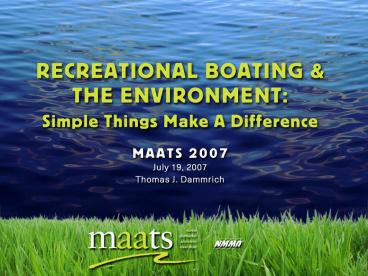sometimes the simple things can make a difference - PowerPoint PPT Presentation
1 / 27
Title: sometimes the simple things can make a difference
1
(No Transcript)
2
(No Transcript)
3
(No Transcript)
4
(No Transcript)
5
sometimes the simple things can make a
difference
6
X
1 Light Bulb
110 Million Shoppers
or
Nashville
or
1.3 million cars
7
(No Transcript)
8
Boating helps bring us closer to the wonders of
nature, and helps us to appreciate the need to be
good stewards. -- Rep. Debbie Wasserman Shultz
its no surprise that boaters are some of our
most ardent conservationists. -- Senator
Sheldon Whitehouse
Boating is not just a coastal pastime, its an
American pastimeteaching future generations of
boaters to have a healthy respect and
appreciation for our natural resources. -- Rep.
Ron Klein
9
Core Corporate Environmental Principles
- Maintaining healthy and clean marine environments
makes solid business sense. - Clean water is the foundation of enjoyable
boating. - Customers are increasingly demanding more
environmentally-friendly products. - Manufacturers help safeguard the environment by
making and marketing environmentally-friendly
products. - Industry is a positive force in building an
aquatic stewardship ethic.
10
So, What Has Industry Done?
Industry has been actively involved in promoting
aquatic stewardship, especially in the last
decade.
- Environmentally Responsible Products
- Maritime Sanitation Advancements
- Cleaner Engine and Generators
- Cleaner Fuels
- Clean Marinas
- Promoting Responsible Boating In Education and
Policy
11
(No Transcript)
12
(No Transcript)
13
Cleaner and Responsible Use
- Marine Sanitation Device (MSD) technology
continues to improve dramatically. - The advances in holding tank technology have
limited sanitation odors. - Maceration and electrolytic decontamination, and
the use of naturally-occurring bacteria to
environmentally convert waste. - Addition of Pumpout Facilities and Education
Outreach on Proper Handling.
14
The Revolution in Marine Engines
- Engine manufacturers have invested billions to
develop direct fuel injected (DFI) two-stroke
engine technology and four-stroke engines. - New Engines will reduce emissions by 75 and make
engines 40 more fuel efficient. - Unprecedented 75 reduction of hydrocarbon
emissions by 2025 from outboard engines, PWC
engines, and jet boat engines.
15
Product Innovation
Promoting Responsible Choices through Product
Innovation
16
The Corporate Role in Encouraging Environmental
Responsibility
Pursuing and promoting technological advancements
that improve the environmental performance of
boats and related products. Empowering
responsible consumer choices through
environmentally-friendly boating products.
Supporting aquatic stewardship education and
outreach initiatives. Promoting legislation and
regulations which protect the environment and
preserve access for boaters.
17
(No Transcript)
18
Environmental Sustainability
The desire to keep outdoor aquatic recreation
open and accessible to the American public is
often portrayed as conflicting with the goals of
environmental stewardship. NMMA takes a
different view environmental protection and open
access for boating recreation are mutually
reinforcing, two goals which can be achieved by
similar means and at the same time.
19
It is the stated goal of NMMA to make boating the
1 choice in recreation. With that endeavor comes
the responsibility to promote proper,
environmentally-sustainable uses of Americas
aquatic resources for future boaters.
20
the simple things do make a difference
- Check Your Propeller
- A damaged propeller will waste fuel. Keep your
propeller blades clean and in good condition. - Tune Up Your Engine
- Proper ignition timing and clean spark plugs will
assure extra mileage and will help - to reduce gas emissions.
- Choose a fuel efficient and low emission four
stroke engine or better yet, - a catalyzed engine if it makes sense for your
boat. - Keep Your Hull Clean A rough hull can increase
fuel consumption - Perform regular hull maintenance to prevent hard
marine growth and reduce underwater drag. - Check Your Car and Trailer
- Keep your trailer and car tires properly
inflated to reduce fuel consumption. - Choose less toxic cleaning products such as
non-phosphate, biodegradable cleaners.
21
Legislative Update
22
Energy Legislation Mid-Grade Ethanol
Although NMMA supports reducing our dependence on
foreign sources of oil, ethanol blends over 10
percent can cause serious damage to boat engines,
fuel tanks and fuel systems. NMMA therefore
sought and achieved an amendment to the Senate
biofuels bill that would require a study of
mid-grade ethanol on recreational boats and
equipment.
23
Energy Legislation Mid-Grade Ethanol
- Any effort to incrementally increase ethanol
blends in gasoline will have catastrophic effects
on boat engines that are designed, tested
calibrated for E10. - Mid-grade ethanol fuel corrodes boat fuel tanks,
reduces fuel efficiency and increases
smog-forming pollution and other emissions that
will harm water quality and habitat. - A move to higher blends could mean extensive
modifications to existing regulations on exhaust
and evaporative emissions, as well as Coast Guard
regulations.
24
Recreational Boating Act of 2007
The Problem. For 34 years, EPA granted
recreational boaters an exemption from the Clean
Water Act for incidental discharges. EPA
recognized that recreational boats should not be
subject to regulations designed for large
commercial vessels.
Late last year, a federal judge ruled that the
EPA did not have the authority to issue this
exemption.
25
Recreational Boating Act of 2007
Ballast water discharges present important
concerns that need to be addressed. NMMA
supports robust measures to halt invasive
species. However, Congress never intended
recreational boats to obtain the same permits as
large commercial vessels.
Got an effluent discharge permit for that,
buddy?
26
Recreational Boating Act of 2007
Legislation would enshrine into law the 34-year
exemption for recreational boaters. Prevent
national Clean Water Act permitting for 18
million recreational boats by Sept. 2006.
Without this legislation, all discharges from
boats, from deck run-off to engine cooling water,
would require federal permits.
H.R. 2550 The Recreational Boating Act of 2007
Introduced by Representatives Gene Taylor
Candice Miller.
27
(No Transcript)































